Juan Atkins Interview, part one
 Daniel Bean
Daniel Bean  Sunday, October 4, 2009 at 10:05PM
Sunday, October 4, 2009 at 10:05PM
by Dan Bean. Part two of the interview is here. Introducing Juan Atkins is no small task. You could use devalued terms like ‘legend’ or ‘godfather’, but they hardly explain why his work should stand alongside the more widely acknowledged masters of modern music. Being an originator has something to do with it, but that’s not enough to explain why we’re still talking about and listening to his records nearly 30 years after his first release. After all, most people would struggle to name the first person to feature a drum machine on a pop record. As it happens that may well have been Juan’s early hero Sly Stone, but the point is that you need to have something more in your music than innovation alone to ensure that people come back to it. You need to have feeling. Of course the best way to grasp what makes Juan’s music special is to listen to it. But for those interested in the sometimes enigmatic figure behind the records Juan speaks here candidly, in his own words. Starting with an interview in June 2008 at his family home in Ypsilanti and concluding in 2009 the day after the Glade Festival in Hampshire, we discussed subjects ranging from abstract universals to the intensely personal. The first topic was the state of electronic music in 2009…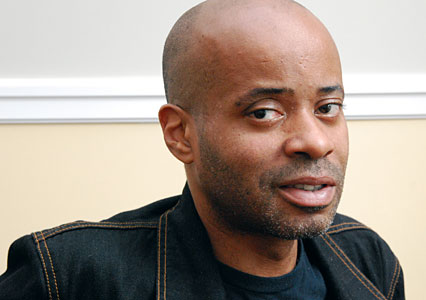 Juan Atkins, Hampshire, 19th July 2009
Juan Atkins, Hampshire, 19th July 2009
Dan Bean: Do you get to hear much contemporary electronic dance music? Call it techno or whatever…
Juan Atkins: You can’t get away from it now. When I go and play a gig the music surrounds me. I got to hear what the previous DJ is playing, and then to a certain degree the DJ that’s after me so yeah, I get to hear a lot of stuff Does it interest you? You know it’s a bittersweet pill, so to speak. With the advent of more music being made and released, you’re going to get more choices and more innovations. But at the same token you’re going to get a lot of bullshit too. It’s not like it used to be. You posted on your MySpace that if you’d known what would have come of techno you’d never have started it. I had somebody else maintaining my Myspace page so everything on there wasn’t things that I actually said. Let’s get that clear. Now I’m more on top of it, but when I first started it, somebody else showed me MySpace and maintained it before I said, “wait a minute, I can’t be having people making quotes for me that I didn’t make.” OK, going back a bit, can you tell me when and where were you born and raised? I was born in the early sixties, Detroit Michigan, born and raised in Detroit. I spent most of my kindergarten, first and second grade in the North West side of Detroit, then we moved downtown for a couple of years, third and fourth grade. Fifith, sixth grade we moved back to North West Detroit. I lived with my father then. Up until the fifth grade my father was incarcerated. What was the the neighbourhood like, do you remember it? Back when I was in the first and second grade it was very integrated, white kids, black kids together. Maybe 50/50, maybe 70/30 white kids, even then. When I moved back in the fifth grade it was all black kids. So that was around 67 [The year of the infamous Detroit Riots]. Did that turn your world upside down? It didn’t make too much difference. Even when I was in third and fourth grade I was living down town and went to an elementary school called Burton Elementary. You had Chinese kids, you had Japanese, from all areas of the world, Mexican. It was a real mixture of different people there. Came back to the North West Side and it was an all black school, maybe one or two white kids in the whole school. The white families had moved further out into the suburbs, but it didn’t really change too much, it didn’t have a profound effect on me or nothing. Because we moved around a lot it was a different mixture of kids in every school. Can you tell me about the music in your house when you were growing up? You know what had a big big influence over me? Because of my father being in jail when I was at a young age I stayed with my grandmother. My grandmother had this Hammond B3 with the draw bars and the bass thing on the bottom and the two sets of keyboards. She blew my mind one time because I’d never really heard her play. One day she said, “let me show you something here.” She scooted me over and started doing this boogie woogie thing and I’m like, “oh my gosh, she can really play!” That was one of the things that really influenced me because when I got bored I would just sit on that organ for hours and just mess around with it. My father played saxophone but of course I didn’t hear him play until he got out of jail. I learned how to play by ear, I would listen to the radio. This was at that time when the 45s were the thing. I started out playing drums and bass guitar, I had an electric guitar for my tenth birthday that my father bought me and I played drums as well because I talked my father into buying my brother a set of drums, knowing that he really didn’t want them. I would play with the music on the radio until I learned how to emulate everything that was on the records they were playing. I was kind of self taught, I didn’t really get any training. Was there anyone in particular that you were trying to emulate? Whatever was there. The one that I really learned to play the drums on was an Eddie Kendricks record… Keep On Truckin? Yeah. I learned how to play drums on that record because it had a nice little drum section in it. Stevie Wonder had some stuff out at the time that was pretty popular. Motown was big at the time, so a lot of the Motown stuff. The first record I bought was Sly & The Family Stone, Family Affair. That was the first record where I actually went into the store. Grandma used to buy us Jackson 5 albums but this was the first time I actually put money out, went in the store by myself and bought this record. I will never forget that, I loved that record. The record store that I bought it from was out of the Motown building down on Woodward [Avenue]. You say you were practising a lot on your own, did you meet people to make music with? I played with a guy down the street when I was in the fifth grade, sixth grade. We had a little band. This was when you could walk down any given street in the summer time and find some guys playing in a garage. You could hear the music in a three of four block radius. People would walk around and stand in these people’s back yards and watch the bands. What did you sound like? Probably horrible [laughs]. We played stuff like War - Lowrider, Sly & The Family Stone - If You Want Me To Stay, I can’t remember the other tracks we played. Covers, bascially? Yes. We were like a bar band, not even that. We caught ourselves rehearsing for some big gig that we never booked or never knew. All we were practicing for was really for the people to come round and watch us in the garage. Were you quite young when you met Rik Davis? Yeah, I think I was seventeen, sixteen. I was just graduating high school. Did he have electronic equipment? Yeah, it was like he had a spaceship, like the Enterprise, when I met him. I had this one keyboard, this Korg MS10 keyboard. We met my first year at Washtenaw Community College. Washtenaw must be a Native American name. Yeah, sounds like an Indian kind of name. They put a lot of stuff on Indian burial grounds out here. That’s why some places in Ypsilanti look like time has just stood still, like no development has gone on. We had a studio in downtown Ypsilanti when we did R9. What made you go out and get the MS10? There was a store called Grenelle’s that sold all these different kinds of organs and they had a room in the back where they sold synthesizers. At the time synthesizers were relatively new for the public. The only people that played synthesizers at that time was Stevie Wonder. When these affordable synths came out, like the Mini Moog and the Korg MS10, they sold them in the back rooms of these huge piano and organ stores. When my grandma went in and was looking at the organs I was in the synthesizer room just messing around until eventually I was able to talk her into buying one for me. I met Rik maybe a year after I got this MS10. Disco was huge at this time and you had people like Giorgio Moroder doing Donna Summer’s stuff with these electronics in it. That’s what actually got me interested because this was [a] really different sound. I looked on the back of the album covers and they would say ‘The Microcomposer’. I’m thinking this is some kind of giant computer, I actually took data processing in high school thinking that it was some kind of computer thing. Was that sound popular? I don’t know if too many people were paying attention, it was just another disco record to certain people, but for me it was a sound, like Sunset People by Donna Summer. It’s almost like the other I Feel Love. If you get a chance to come across it, pick it up. It’s got that same type of sound. He put it together real well and she was my idol for a minute. I had a big crush on Donna Summer for a while. Those were great tracks. There’s something about I Feel Love, it’s quite melancholy. When I hear it, it makes me feel a certain way. You feel love huh? Yeah, bitter sweet. Some of your records make me feel similar to that. I was heavily influenced by Giorgio Moroder productions, The Chase and stuff like that. Were you into the progressive scene in Detroit? Yeah, we were actually DJing, we had a sound company called Deep Space. You had Direct Drive, but ours was Deep Space and we were the competition, we were the new boys on the block. We got a couple of parties and we killed them! The competition was stiff. Delano [Smith] and Daryll Shannon. Al Ester, Duane Bradley… They were all Direct Drive DJs. It was just me and Derrick [May] and then later Eddie Fowlkes came and started playing with us. We made up Deep Space and eventually we had a battle with them, it was crazy. When you say you went to the parties and killed it, what was your secret weapon? The difference was that we were playing all new music, they were stuck on the retro disco Philly International, almost on the house tip. They would play these same records over and over and over, that was their thing. Over Like A Fat Rat [by] Fonda Rae, Kasso [by] Kasso. You go to a Direct Drive event and you know what records you’re going to hear. We were playing B52s, all of the new releases, all of the new disco, house stuff. Whatever was new we were playing it. We were in one of the leading record pools called Dance Detroit, Ken [Collier] hooked us up. Even the Direct Drive guys weren’t in this record pool. We got a lot of stuff that Ken was getting early, direct promos from the companies. This was at the time when record companies serviced the record pools. What people liked about us is that we weren’t scared to be different. We used to tell a lot of the guys that we worked with, “look man, do not be scared to play something new, if you like it, then play it.” Was it a more open time? I’d say now is a more open time because you’ve got so much music out there, so therefore the DJs can’t help but to play different stuff. You can go from city to city and have different stores and different shops that have totally different record selections. You’ve got people downloading, you’ve got people sending you promos directly from artists to the DJ so it’s even more vast now than it’s ever been. But I couldn’t help noticing at the [DEMF] festival this weekend that music sounded really homogenous, like someone was playing the same track everywhere. [laughs] Yeah, I felt the same thing, unless you went way back to the Red Bull stage. Did you start introducing machines into your sets when you were DJing? We were using a TR808 sometimes in some of the sets and that’s when we had that ultimate battle with Direct Drive. That was our secret weapon and when we brought out that 808 and mixed it in with the tracks people went crazy! We won hands down, they were really embarrassed. And no one had ever done that before? I think we’d done it one time at a party before that, at one of our sets at the Downstairs Pub. The venue was famous for those type of progressive disco parties. It was different clubs, but all of the the people that did stuff there were in the same circle: Zana, Chapatino, the Charivaris, these were all different social clubs that would throw parties. We threw a couple of parties there, me and Derrick. One club we called Kaos, and there was another one we called The Third Way or something like that, after the Alvin Toffler book. We broke out the 808 at one of those parties one time and it worked out real well, that machine has a sound that stands alone. So Alleys Of Your Mind was out at this time? What happened next after that? The second release came out, Cosmic Cars, the one that everybody played at the parties. We only had a 45 release on Alleys Of Your Mind. The disco era produced the disco version which was the 12 inch single. DJs like Ken Collier didn’t play 45 records, he played 12 inch discs, but the 12 inch disc was kind of new, especially to the consumer. You had some promotional only 12 inches that you couldn’t even buy, that were just straight up promotional copies. When you went to the store it was on 45. That was the thing with Alleys Of Your Mind, a lot of DJs couldn’t play it because it was on 45. It was funny because I saw one DJ actually have one pasted to a 12 inch record, in order to have the 12 inch format [laughs]. That’s how bad he wanted to play the record, you know what I mean? Nobody still had their 45 thing [adapter] for 1200 turntables, so people just didn’t play them. That was the drawback from Alleys Of Your Mind and was one of the clashes that me and Rik would have. I would say, although it would have cost slightly a little more money, “man, we’ve got to release this record on 12 inch format,” but he didn’t listen to me. Economically it was a sound decision because we sold a lot of those 45s. Even though it was a single, it [a 12 inch] cost you the same amount that it would cost to press a full album for just one song. Big record companies were able to do that but independents, small upstart shoestring budget labels, couldn’t be paying album prices for just one damn record. And Cosmic Cars was on Fantasy in the end? Yeah, we released that on Deep Space and then shortly thereafter we got picked up by Fantasy. They found you? We had a following. Alleys Of Your Mind was huge in Detroit and then we came with Cosmic Cars. We had a new sound and we were selling tons of records. The independent distributors couldn’t ignore that because they would go into the store and we’d be number one on the chart. They’d be trying to chart their records and they’d go into the store and be, “well hell, who are these guys? They’re number one on the chart, we’re here trying to pay you to get on the chart and we’re not distributing their record?’ So eventually they had to get us under their wing. That was your first experience of dealing with big record labels? Yeah, it was crazy because you had rivalries between one stops. A one stop is what you call a wholesale house where retailers would go and buy all of their products. You had stores that were competing against each other for this Cybotron record and we had one store tell us not to sell it to nobody else. If we went and sold it to the other one stop then they would stop selling it. All of that crazy politics going on and they had certain DJs under their wing, certain radio stations. All of a sudden your record would be playing on one radio station and then it would stop playing on that station and start playing on another because you sold to the other distributor, it was crazy. So you navigated through this? Through this maze, because a good record you can’t stop. People drop thousands of dollars into records but nothing sells a record like a good record. You don’t have to do promotion, if it’s in the grooves and it’s good it’s going to sell itself. Did you know that you were making a hit? I had no idea. I knew what I liked and I knew that I’m going to make a piece of music that I would go out and buy, I’m going to make the hottest possible record. Eventually as I manifested this into the universe I guess that’s what happened. I made the record that would make me go crazy in the store and ride around all night to find it, and it worked. Were those tracks made in a conventional studio? Nah, we had our own set up at home, an eight track studio. We never cut or released nothing out of that studio, that was just something for us to get our ideas on. Alleys Of Your Mind was the only thing that was cut at home, and even then we didn’t record it in our studio, we had another friend that had a setup and we went to his house. We had to take all the gear into the studio. Records like Cosmic Cars, Clear and all of that stuff were done in a major studio. What we did was pack up like we were going to do a show or something, get into the studio, cross you fingers and hope those sounds would come back. All of this stuff was done before midi. They had this thing called sync that was pre-midi, but if things did have that it was only a couple of other manufacturers that you could run with sync. You couldn’t use a Roland drum machine and an Oberheim keyboard. Korg kind of worked with Roland but not with Yamaha. When you went into the studio the MS10, the Arp Odyssey and Arp AXXE were keyboards that had no memory capability. You either had to write your patch down or just memorise where your nobs where. The bass on Clear was a staple sound for me so I knew how to go right to that MS10 or that Pro One and turn the nobs and setings to get close enough. None of the stuff that we actually recorded sounded like it did when we originally did it at home. Not to say that it was better or worse, but it just was different. Were you and Rik composing together? Mainly we were right there together, but sometimes there were a couple of tracks like Clear where I did most of the track. I had [key]boards and stuff at home so I more or less made that whole track. When I brought it in we did a version and he added a little top keyboard line to it and that was it, then we went into the studio and recorded it. Did you think you might be making history with Clear? At the time we were just trying to do what any other band was doing, original stuff. Making what you thought was good and that was it. We were never entrenched in the music industry to know that we even had an opportunity. We never had a record deal like these big record groups, Earth Wind & Fire, Cameo and people like that. The big funk bands who had these deals knew that they’re going to get radio play, they’re going to get promotion, they’re going to have their product covered at every radio outlet in the country at the same time. We didn’t have none of that so there was no way of knowing what was going to happen with the music. We were hoping, but it was never fame and fortune, it was just about making what we considered good dance music. Do you still feel that way? Yeah, because I don’t have a deal right now. When you’re making stuff that’s not really commercial that’s the sacrifice that you’ve got to make. If you ask me, really good stuff is not the popular stuff, so do you really want to be in that arena? Especially now, it’s perfect for guys like me because I can go direct to my public. I don’t have to sit there and hope the radio station adds it to the playlist, go and ask them and beg and be nice to the program director, “why ain’t you playing my record?” You don’t have to worry about that now. Did you used to do that all yourselves? Yeah, we did. Even with the Cybotron stuff we never got the amount of airplay even with the popularity of the record. We never got more than three spins a day. When they’re giving you heavy rotation you’re hearing the record every half hour. Do you think it’s because you were so different? Yeah, but the phones were ringing off the hook! “Cybotron, Cybotron, Cybotron!’ They had to play it but I get the impression that they played it as much as they had to and nothing more. They gave it just enough play that satisfied the listeners. There was one radio station, the new radio station that came in right when Cosmic Cars was released. There was all this politics going on and they thought they had squeezed us off the radio and this other station came in and used that record as their calling card when they came on the dial. That was a blessing right there. They played that record heavy, they played it more than anyone played our music. Was that through Mojo? Mojo was playing it but Mojo was caught up in a little politics as well. He said, “this record is only 30% of the work.” What he was saying was that the physical record and everything in the record was only 30%, the other 70% was promotion and marketing and payola! [laughs] Not to say that he was asking, but he was giving us the realities of the music biz. He never asked us for a dime to play our music, but he knew. He was in radio and he knew what was going on behind the closed doors. What he was saying in so many words was that at some point you’re going to run up against having to pay someone to play these records. It was frustrating, but it is what it is. Of course I had somewhat of a bittersweet taste. We didn’t have pirate radio over here so you [were] still kind of stuck under the gun of the major radio market. The first time I heard pirate radio stations in London I was floored! The pirate stations were the ones breaking the music in the UK. It was really progressive and more open than any outlet in the USA. Did you part company with Rik after Enter came out? Yeah, Clear was the single from the album. We did Techno City and R9 singles after that, and that was the musical difference. Techno City, although it was a good record, I didn’t feel like it was the record to follow Clear. And the funny thing is that I’d made Night Drive, that was actually supposed to be a Cybotron track. I campaigned for that record to be the next release. Coming behind Clear, it would have been perfect, this electro thing was huge at the time. I took Techno City around to programme directors and next day they were handing me the record back, “man, this ain’t the Cybotron I remember.” Techno City was a good record, but that was the more Rik’s thing. I don’t know if he felt like he wanted more creative say in the hits. I was the one responsible for Alleys Of Your Mind and Cosmic Cars, these were all my bed tracks. I guess that at this point he must have felt like, “I want to have something that I laid the bed track and made it.” No offence man, but this ain’t the record. And sure enough we totally alienated everybody that we had on the bandwagon with that one record. You’ve got to strike while the iron’s hot, we let it get cold with that record. So I took Night Drive and released it as Model 500. When did Metroplex actually start? 85. The album came out in 83 so this was a couple of years after. Were you still doing the Deep Space parties? No, that scene faded away around 83. When all of the international DJ stuff started I was like, “what do you look like playing in a back yard in Southfield Michigan, when you could be in England, in London, playing for 5000 people?” So eventually that’s where that went. Were you and Derrick still doing stuff together at that point? What happened was Derrick and Kevin [Saunderson] didn’t actually start making records until around 86/87. We were DJing together but I think Kevin was delivering pizzas for Dominos. Derrick was working at the video arcade selling tokens. Nobody was thinking about releasing music until a situation came along that allowed them to get musical gear for next to nothing. I ain’t going to go into whatever was going on, but if you needed some money and you had a pair of turntables that was one thing that you didn’t have no problem selling. So you know, “damn, Juan has been releasing these records and shit, let me start tinkering around with it.” Derrick was one of the better tinkerers. Did you help him? Yeah, my phone was ringing constantly, 24 hours with questions. Eddie Fowlkes was calling me at five O’Clock in the morning! “Hey man, I hooked the cord up into the input of the duh duh duh, and I ain’t getting no sound, what am I doing wrong?” And it’s like, “damn Eddie, it’s five o’clock in the morning dude!’ [laughs] I went through that, no sleep days. I can remember a time when I got out of bed to go help Kevin with a sampler at six am, by the time I got to his house it was daybreak. They would sit up all night and do these sessions, him and James Pennington, Santonio [Echols]. It was the same thing I did when I first got gear, you lose scope of time when you’re sitting there messing around. You’re hooking wires up and you’re trying to make some stuff, time flies past. The next time you take a break you go and look out of the window and it’s day, sun is coming up but you don’t pay attention to that. I had my own studio by this time as well, so records like Big Fun were cut in my studio. That was James and Kevin, they’d made the ground track but when it was time to cut it they brought everything into the studio and I added the bassline to it. They came in with the track and didn’t even have a bassline to it. Were you just mixing it live, straight onto tape? Yeah, we recorded to two inch tape, before digital, before DAT. You’d do a mix and you had a fader set one way. Then you would stop it, reset the faders for maybe another change, do another pass and then edit it together. Part two of the interview is here…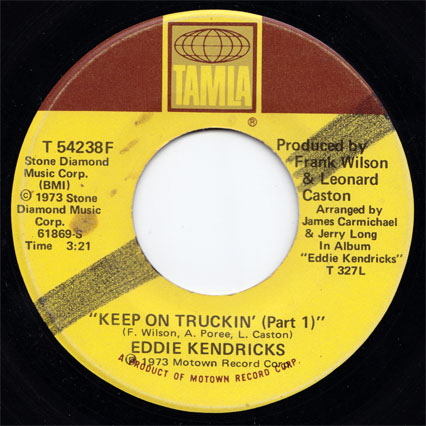 Eddie Kendricks - Keep On Truckin’ (Tamla 7” 1973)
Eddie Kendricks - Keep On Truckin’ (Tamla 7” 1973)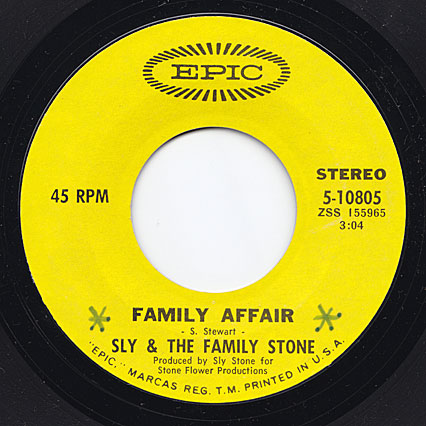 Sly & The Family Stone - Family Affair (Epic 7” 1971)
Sly & The Family Stone - Family Affair (Epic 7” 1971) 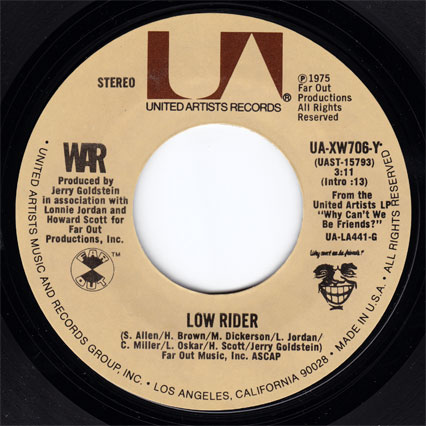 War - Low Rider (United Artists 7” 1975)
War - Low Rider (United Artists 7” 1975)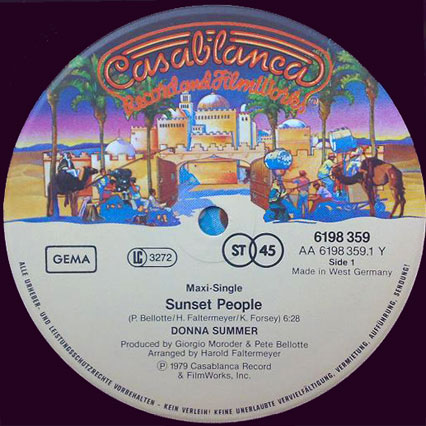 Donna Summer - Sunset People (Casablanca 12” 1979)
Donna Summer - Sunset People (Casablanca 12” 1979)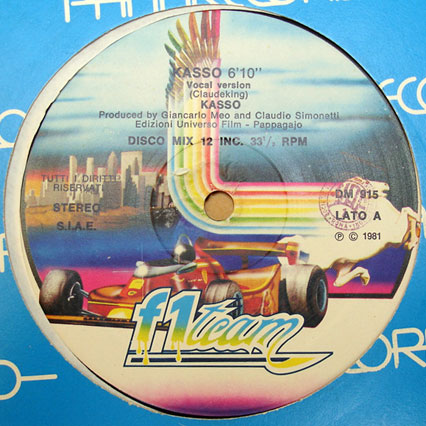 Kasso - Kasso (F1 Team 12” 1981)
Kasso - Kasso (F1 Team 12” 1981)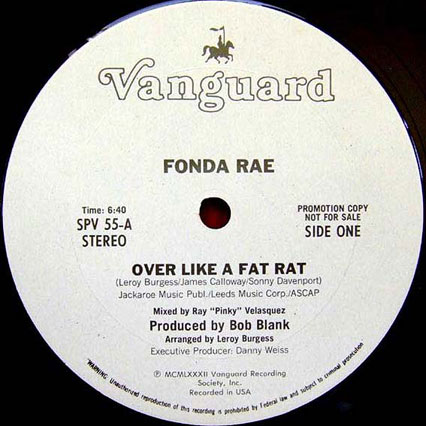 Fonda Rae - Over Like A Fat Rat (Vanguard 12” 1982)
Fonda Rae - Over Like A Fat Rat (Vanguard 12” 1982)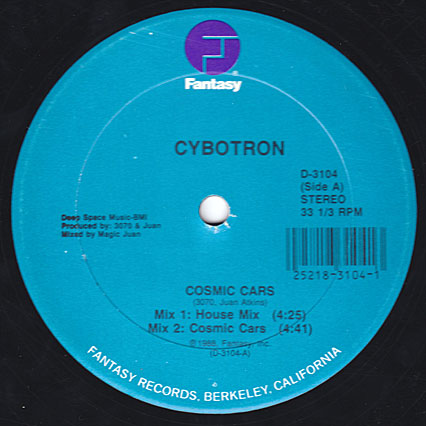 Cybotron - Cosmic Cars (Fantasy Remix 12” 1988)
Cybotron - Cosmic Cars (Fantasy Remix 12” 1988) 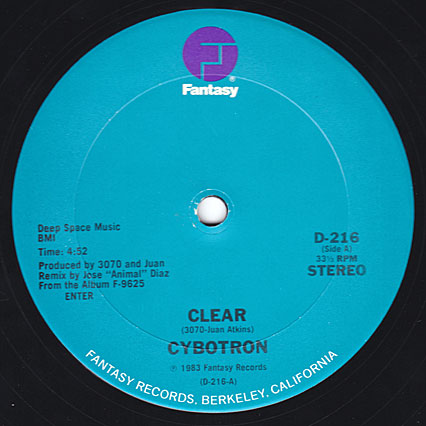 Cybotron - Clear (Fantasy 12” 1983)
Cybotron - Clear (Fantasy 12” 1983)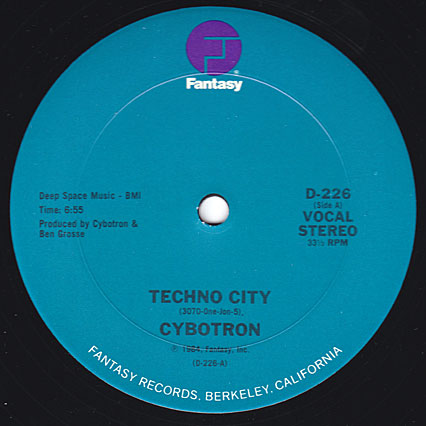 Cybotron - Techno City (Fantasy 12” 1984)
Cybotron - Techno City (Fantasy 12” 1984)

Reader Comments (16)
great interview!
That was a load of crap, The first guys to break the B-52's, Devo and the new wave sound in the Detroit progressive scene was Mike Neal and Nicky Allen who ran Studio 54 in Detroit and later opened the legendary clubs Luomo, The Steam Pit and The Rich and famous. Darryl Shannon and Direct Drive where the first to play those tunes in our scene along with Caution UFO, The fabulous Poodles, Visage, Kraftwerk, Yellow magic Orchestra.
Direct Drive and Deep Space never had a contest or battle or whatever, and we never thought of Deep Space as competition, because we got all of the gigs. We had the hottest DJs and we had a huge light show, the only Light show in town. The only gigs Deep Space worked were their own, they threw parties under the name Kaos.
I like Juan and Derrick and I were room mates in the late 80s, I used to kid Derrick that the reason they had so much time to develop their music was because they didn't have any gigs to work. Darryl Shannon, Kevin Dysart, and later Ray Barry and Mike Agent X Clark were by far the busiest and most popular DJ's in Detroit.
The only competition Direct Drive had on any level was Sound Wave, Carl Martin and Later Delano Smith. Delano was the only real challenger to Darryl Shannon's throne because not only could he play, but the Girls thought he was cute too.
Direct Drive set up Ken Colliers gigs we frequently supplied him with the latest New York light shows and fog machines. Ken Collier himself did gigs under the Direct Drive name.
From the DJ List web site's biography of Eddie Fowlkes:
"amidst the thick fog, flashing lights, and crowded dance floor of the underground Park Ave. Club, fourteen-year-old Eddie Fowlkes undergoes a magnificent epiphany. While watching Darryl Shannon, he is hypnotized by the stream of seamless beats leading him to uncover a deeper understanding of music's power to affect people."
Juan has had enough success and accolades without having to engage in revisionist history. We have always been proud of what Juan, Derrick and Kevin developed and we surmise that perhaps Juan's memory is a touch foggy after all these years.
Hassan Nurullah and Todd Johnson
If you doubt our Bona Fides, Pick up a copy of Dan Sicko's seminal work on the history of Techno; "Techno Rebels" We were the first two people he contacted for an interview.
It is always interesting after all these years how history changes depending on who is telling the story. Direct Drives tales and adventures are frequently mouthed by those that have no knowledge of the facts. Direct Drive was a DJ company created by Todd Johnson as a brand to ultimately unite all of the top jocks from the early 1980's dance party explosion. Darryl Shannon was the first to use the name but history shows that most of the top jocks of that time have either worked under the banner at one time or another. (Darryl Shannon, Delano Smith, Kevin Dysard, Duane Montgomery, Ray Barry, MIke Brown, Joe Davison, James Wells, Whitney Slade, Reggie Brown, Reggie Harrell, Alan Heath, Mike Clark, Stacy Hale, Theresa Hill, Alan Ester, and yes, even the legendary Ken Collier found this association lucrative at times.) If you didn't spin with us, you at some time found a need to use equipment set up by the Direct Drive crew. (Hassan Nurullah and Tim Slater.) We worked every weekend through the early 80's. And at the time never thought of anyone as competition. The top dance promotors of the time used our services. (Charavari, Reminque, Rafael, The College Men, Zana, Courtier, Charles HIcks, Bratts, Snobbs, Twinz, Next Phase and Gables to name just a few. I don't recall thinking of you or anyone as competition, we had more work than we could service. The other crews I remember from back in the day were Darryl Harvey and the Ritz Sound Company, Charles HIcks and Music Line, Carl Martin and Sound Wave, Terry Adams and William Tandy of Courtier Sounds and Marc Duncan of Duncan Sounds. They were peers not competitors, the work was plentiful. You are correct when you state that Direct Drive was not in the Dance Detroit record pool because like Ken Collier our samples were sent to us directly. New releases in the hands of Direct Drive at the time guaranteed play. Some of the parties where you state we played the same records over and over was the sound of yours and many other local acts early releases being replayed and blasted out of the tower of Cerwin Vegas. That is local support and you can thank me when you see me next.
There was never any ultimate battle or contest nor any parties where we worked a room together or you killed us as you speak of in your interview. The only thing I an embarrassed about is that you would mention Direct Drive at all in your pure fabrication. It is all in the alleys of your mind.
I have listened at many events with respect at the spinning talents of Kevin Saunderson, Derrick May, Terrance Parker, Jeff Mills, Eddie Fowlkes, Alton Miller, Blake Baxter, D Wynn, and too many others to name from your era. I consider both Derrick and Eddie as personal friends. I have never had the pleasure of making your acquaintance but I hope your turntable skills are better than your memory. I wish you success in your return.
Todd Johnson
<object width="425" height="344"><param name="movie" value="http://www.youtube.com/v/5vAf8LwMuYQ&hl=en&fs=1&"></param><param name="allowFullScreen" value="true"></param><param name="allowscriptaccess" value="always"></param></object>
Juan is rightly regarded as a key musician and producer in the development of dance music. He has never been known as one of the world's key djs. With all respect to the man for his achievements, it's difficult to imagine Juan winning any mixing contests now or at any time. In my own view, his dj skills have improved in last ten years, but still only to a point where the records he plays not his skills as a dj stand out.
This article was brought to my attention from a good friend of mine that lives in Spain and has the highest regard for Detroit Music and you -Juan Atkins. I met you one time in Detroit, the summer of 02 (I think) It was shortly after the release of the Hi-Tech Soul DVD release and although our conversation was brief, It was a pleasure to have finally met you and I thought you were a cool brother. In my interview on that DVD, I gave nothing but praise for Derrick, Kevin, you and Eddie's contribution to electronic music. But after reading this, I must say I have questions about your integrity my brother. Articles like this is why folks today do not know the real history of how and where artists like yourself drew your inspiration from. I guess i should be somewhat flattered that you would include my name in such nonsense, I must have been doing something right then and now for you to allow such garbage to be printed and posted for the world to see. I never competed in these "DJ Battles" you speak of in your interview, nor had I even heard of you until your early releases, which incidentally I didn't play then and don't play now. And if a battle did take place, I doubt it if you had won anything as I understand your dj skills were somewhat questionable, then and now.
I was a member of the Detroit record pool Dance Detroit for three years and never saw you there once picking up your records for the week. I was very good friends with Ken Collier (RIP) and we played together weekly at Detroit's Studio 54, The Downstairs Pub and L'uomo Detroit (both locations) and I dont recall Ken ever "hookin you up" with anything. Nor do I remember seeing you at any of the hot spots back in the day. Ken was a very good friend and mentor to me, please show some respect to the deceased. Your fans that read this article have no reason not to believe your story - I surely hope they are reading these comments.
Although I am not a big fan of Techno, I can respect your contribution to electronic music, but I cant respect this.
Delano Smith
Pro DJ
Juan,
This is Theresa Hill. We had the opportunity to speak on a few occasions and you were also a guest on my show when I was an on air personality on 90.9FM WDTR in Detroit. I can apperciate you stating what you feel was reality of the early dance music scene in Detroit from your point of view. I believe that in telling your story, there were a few things that didn't ring true for me. I started partying in the fall of 1980. I don't ever remember there being a DJ Battle between Direct Drive & Deep Space. Pleae refresh my memory. Where was this battle? Who were the DJ's in the battle? Also, you stated that none of the DJ's from Direct Drive were in Dance Detroit. I know for a fact that the following DJ's were in Dance Detroit: Darryl Shannon, Delano Smith, Al Heath, James Wells & Ray Berry. I would go to Steve Nader's office on 9 Mile & Woodward in Ferndale with Darryl Shannon weekly to pick up new progressive dance music so for you to make the statement that none of the Direct Drive jocks were in Dance Detroit was not factual. I have video footage dating back from 1980 and beyond of the hot progressive parties and I don't recall seeing you in any of the footage. The day you were a guest on my radio show, Jeff Mills (The Wizard) was there as well. I have on audio tape Jeff Mills saying that the two DJ's who influenced him were Darryl Shannon & Delano Smith. I know that Charivari would have parties at the Park Ave Club in Downtown Detroit and the DJ's Darryl Shannon, Darryl Havey, Charles Hosley & my cousin the late Duane Montgomery would play everything from The B52's, The Police, Queen, The Fabulous Poodles, Depeche Mode, Human League, Lena Lovitch and the list just goes on and on... After I read your story, I felt that you had been hit by one of your cosmic cars. Please try and be more factual in the future when giving interviews at home or abroad reagrding Detroit's Dance Scene!!
Musiclly yours,
Theresa Hill
My name is DJ Al Ester from Detroit (Direct Drive) and I was mentioned in Juan's article. When it comes to matters like this, I have a memory like a steel trap. For me, one part of this interview was not quite CLEAR...
There was never a straight up DJ battle between Direct Drive & Deep Space. However, the closest battle I recall was my very first DJ contest at the Afterglow in 1983. I wiped out at least 3 of the DJ's who played under the name Deep Space and won the contest hands down. So please enlighten me and tell me again where this battle was and when did it take place? We're in our 40's now and I know sometimes the mind can play tricks on you. HOWEVER, let's not drift any deeper into the abyss of DEEPSPACE!!!!
Respectfully,
DJ Al Ester
Ok reading most of the article and all of the comment I found it funny and delightful to see all my old comrades on here and because I was in that famous contest I feel its important to shed some light onto this situation, Obviously there is a blank spot with some of the peeps because there was a time gap, It was in the mid to late 80's. During that time as a turntablist there were many contest that took place, My generation (under Delano and Todds etc) were the new reps of the scene Direct Drive covers the late 70"s to mid 80's pretty much by themselves.. as Todd mention earlier there were no competitors.. There was a hormonal balance where everyone worked together. DD had a majority lockdown because because it was a all around unit! The Lights, the sounds, the djs, And even the locations. They were the innovators of that time because they (we) took an era of disco and club which were adult and took it to the high-school kids and spawn a scene that took people like me and changed our lives. I take pride in meeting them while in Jr high-school thru my older brother who for a short period in time was part of a group call "Gentlemen of the 80's" and I met all of the guys, Todd Hassan Delano etc and at the time I was known under my 1st name with them (Gil's lil bro) lol. Coming up years later under their wing learning the buss, in highschool Todd asked me to be in one of the groups (Gables) Since I was one of the few peeps he knew young enough that could keep the tradition the had started a decade prior! Maybe a month later I confessed to him I really wanted to be in Direct Drive and he swapped the Gables Jacket To the DD Jacket (I still have mines hehe). Now as I mention earlier my generation was on the more competitive end of the situation, Me and Al Ester share more stories together than me and Delano then because he went off to college and me and Al had been spiinin kida together since Jr High-school. Deep Space which I recall being a group founded by Juan and derrick were the new kids on the block! They were on the path to prove their worth. The were alot of storie of back in the day when they coming to my gigs with their new hot jocks, I remember them bringing "Scratchmastrer Reese" (Kev Sauderson) to one of my gigs at the shelter I believe so I can check him out and Hurtus Cummings (please excuse if the name are spelled wrong. Now what I'm about to say I hope I don't offend anyone but through my eyes i will tell it as I saw it. I believe there was kind of bitter blood because of our young competitive age, Eddie was always talking shit about us. I remember when Derrick introduced us he was talking shit about us to my face, Me and Derrick were always cool about our companies DD and DS but the people around us were always trying to stir up trouble which eventually lead to this contest. What I saw was we had a lockdown on the inner city detroit peeps. been doin it a decade +. 1st generation Darryl Shannon Delano and Ken Collier into Kev Dysard and Ray Berry and now its falling in to me and Al Ester generation which DS was a part of that generation, I recall DS having a lockdown on more of the Suburban folks hint when Music Institute happened the Suburban audience were in full bloom there hence when Techno the music came out they were on top of it hence to this day they are knee deep in to it and running it now! But at contest that Juan speaks of was in the Downstairs Pub, Now my memory isn't 100% accurate so by all means correct me if I'm mistaken, As one of the battle cats of DD it was usually me, Kev Dysard, Ray Berry and Duane Montgomery (RIP) and once Ken Collier! Me being the youngest and up and coming. I believe this contest was me ,Ray and Kev against Derrick Juan and Eddie. We were the the Scratrchers, the beat jugglers of the city then and they were more or less the creative blenders..not really known for their tricks. We had signature moves that made us who we were. they were more into the post industrial/Italian disco tip almost strictly and us DD did that and club/progressive style. When the contest happened, call me bias, we were destroying them on the decks lol but the had a machine hooked up to the mixer and no one knew what it was that they had. I remember it was white with red lights racing across it! I thought to myself what is this fancy typewriter looking thing connect to the mixer for. They were saving that for last! When one of them ( I believe Derrick) hit the button on it, a drum track comes blaring out of it! Freaked everyone out!, then they started hitting more button getting different patterns to come out. at that point, everyone in a state of shock with this machine producing these hard, set ass beat and no turntable was involved it left everyone in awe, especially me! The element of surprise and the change and shift in history as we know it! The new birth of djing! the use of musical equipment with turntable. The won with the element of surprise doing what was never done before as far as we know. By todays standards, they just hooked up a drum machine and play it in their set! No Big deal now, but big deal then! But that was why they won! A moment in time! On the Decks, minus that TR909 (not TR808) I believe we still would have won that contest hands down! Again this is my memory of that contest. If there is any dispute please refresh my memory and I say again, Hope no one is offended! Just the fact of it all thru my eyes...
Mike Grant just made me aware of this interview today, I am really too tired after helping Kevin Saunderson with the gig tonight @ TV but briefly let me clear up a few things. I'll go into more detail later...
Keith Martin & I came in Deep Space after Eddie Fowlkes as the 4th & 5th members of the Deep Space crew (Angelo Ashton was loosely affiliated as well as some others).
We were members of Steve Nader's Pool - Dance Detroit from at least 83 on IIRC, maybe one of the reasons Teresa never saw Juan or Derrick picking up records is because that was my responsibility as well as making sure the dues were paid. I was a member for number of years and Juan or Derrick's name remained on the Roster until eventually Steve transfered the slot (37 i think) to me when the fellas went on to make hit records. I later left Dance Detroit for Midwestern Dance where I went on to become the Asst Director of the pool.
Briefly, Mike Clark seems to recall the so called battle best as it happened. Yes, there was a 909 drum machine involved (same one that was rumored to be sold by Derrick May to Frankie Knuckles to start the Chicago House Scene). Apparently the party at the Downstairs Pub was recorded and Eddie Fowlkes and I were the hype men on the mic and sometime during the night Eddie says - "We use no turntables" and I said "Fuck the Drive - Let's Get LIVE!" and it pissed Ray Berry off and he was ready to fight.
Mike Grant has a audio recording of the night and I have been trying to get a copy for years - all he will give me is snippets. Maybe as these comments get read by all involved in the scene back in the day, Mike will post up the audio and clarify this situation.
More to come later...
I am very surprised to see the very negative comments from some of my colleagues in the Detroit dance music community. My intention was not to degrade or insult anyone, and I have no reason to lie about anything, or anyone. I may have made a mistake about saying that direct drive dj's were not in Dance Detroit record pool, my apologies. However, I do remember playing a party where particular top direct drive dj's were asking me where I got certain records from that came from the record pool. They were obviously not in Dance Detroit at that time, or somehow not getting the same records we were. There were certain dj's in the pool at certain times. I was not keeping track of what dj's were in the pool, and when. My bad.
Also, I never claimed the we played the B52's, Kraftwerk, etc. exclusively. However, I rarely heard this music played by other dj's. I was not keeping track of who was, or was not in "Direct drive"
What does me being or not being at these so called 'Hot progressive parties" have to do with price of tea in China? please don't be mad at me because I may not drink the same flavor koolaid as you. And, any DJ who questions my DJ skills, I hereby challenge to a battle, and I bet money that I will take your ass out!
J.A.
Love Juan stuff but why wasn't there much talk about all the different types of Music from the late 1970's to 1990's.What kind of Music were all these DJ's playing between 1979-1986 ???? was it a mix of Euro Space Disco,P-Funk,The British New Romantic,Electro,Old School Rap,Miami Bass and all the Electro stuff from L.A..
All the best.
was fun reading all the comments. @ Juan A. did any of the other people commenting record anything as to prove they blew you away in respect Music Hits and/or production? Regardless im sure there are some great memories from back in those days.
neogarl e3d3fd1842 https://www.acctot.com/granalcadi
neogarl e3d3fd1842 https://www.acctot.com/granalcadi
neogarl e3d3fd1842 https://www.acctot.com/granalcadi